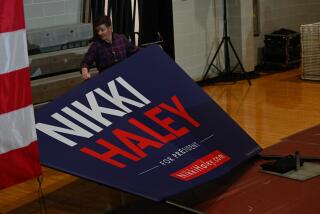Buchanan Leads Uphill Charge in Dixie : Campaign: The GOP contender faces a far different sort of voter in the South. The recession is less of an issue and patriotism looms large.
- Share via
ATLANTA — Midway through the first day of his first foray into the South, Patrick J. Buchanan’s presidential campaign found itself going nowhere.
In Charleston, S.C., to crash a Republican conference where President Bush was speaking, Buchanan was held up by a traffic jam--created by police reserving a lane for the President’s motorcade.
As the minutes ticked away, another candidate might have fumed. But the conservative commentator instead saw in the situation a fresh metaphor for the populist flavor he is trying to convey:
Bush, the “Exeter and Yale Club big government Republican,” travels in his own special lane and has lost touch with ordinary folks, Buchanan says now. But he, Pat Buchanan, is a true man of the people, stuck in the same traffic jam as the middle class.
“My campaign is aimed not simply at conservatives and not simply at Republicans,” he told a recent rally in Tampa, Fla. “Our appeal is going out to the whole country. This is a broad-based campaign. . . . We have given people who feel left out and forgotten a cause.”
Never mind that Buchanan, 53, was born and reared inside Washington’s politically infamous Beltway--the highway that rings the capital--in well-heeled Chevy Chase, Md. Never mind that he was an aide to three Republican presidents and is as much a capital insider as anyone who never held elective office. Buchanan casts himself as a political outsider, a rebel with a conservative cause.
Whether he can turn that image into victory at the Republican National Convention--or in the South, where Bush is still popular--is problematic. Buoyed by his strong showing in the New Hampshire primary last week--he won 37% of the vote to President Bush’s 53%--he is eager to try.
He is more careful with his rhetoric these days, avoiding the kinds of comments that give ammunition to critics who accuse him of being racist, anti-Semitic and anti-homosexual--charges he denies.
But it is not always easy to square the well-reasoned and compassionate approach he now projects in interviews with the “Honk if You’re Angry” bumper-sticker philosophy that animates his campaign appearances.
Sometimes, with the miniature American flags waving and a conspicuously all-white crowd chanting, “God Bless America, God Bless Pat!” the emotions of the moment seem to get the better of him--such as the time he mimicked the Japanese prime minister’s poor English at a fund-raiser in Orlando, Fla., or his comparing recipients of U.S. foreign aid to welfare cheaters “freeloading” off Uncle Sam.
Buchanan is angry at the Japanese and the Chinese for flooding American stores with their goods while keeping U.S. products out of their markets. If elected, he told one audience in Florida, he would call Chinese leader Deng Xiao-ping, whom he derisively calls “Mr. Dung,” and tell him: “We’re taking most favored nation status away and putting you in Chapter 11.”
Buchanan is angry at the World Bank and the International Monetary Fund, institutions he suggests are sinister and are bent on “draining the wealth of the United States” and spreading it “around the Third World.”
Most of all, he is angry at George Bush for “walking away” from true conservative Republicanism. In Bush, he tells his supporters at every stop, “we expected a continuation of Ronald Reagan’s legacy, but what we got was warmed-over Jimmy Carter.”
Buchanan’s crowds in the South have been modest in size, averaging 50 to 200 people. He has less time to win over voters here than he did in New Hampshire, where he campaigned for 10 weeks. The Southern states’ primaries begin March 3 and explode March 10, on Super Tuesday. Voter anger over the recession, which Buchanan tapped in New Hampshire, is more muted in the South.
Buchanan also must overcome his opposition to the Persian Gulf War in a region where patriotism and support for the military are synonymous.
And there is David Duke, the former Ku Klux Klan leader and neo-Nazi who is also challenging Bush for the Republican nomination. Is Buchanan competing with Duke in states where both their names will appear on the ballot? How does he feel about Duke’s urging his supporters to back Buchanan in Georgia, where Duke has been kept out of the race?
Buchanan clearly wishes people would stop asking him those questions. Duke, he says whenever the issue comes up, is “irrelevant” to the race. “I did not seek his endorsement,” he adds, “nor do I welcome it.”
Although he has tried to distance himself from Duke, he has not renounced him in public when given the chance to do so. He has said only that he plans to deal with Duke by ignoring him.
Buchanan’s problem, one aide acknowledges, is that he needs the votes that might otherwise go to Duke in the South, but cannot compete for them directly without alienating many mainstream conservatives--voters already troubled by what they see as Buchanan’s protectionist and isolationist views.
For all his disadvantages in the South, Buchanan has one thing Bush clearly lacks: a way with words. He writes them down by hand on a yellow legal pad before each campaign stop, underlining the jokes in red.
Before a crowd he can be charismatic, firing off perfectly sculpted sound bites with devastating accuracy. Alluding to the Bush campaign’s decision to have Vice President Dan Quayle attack him, Buchanan told a rally in Ellijay, Ga., that he had expected Bush to turn on him like “a pit bull” after New Hampshire.
Instead, he got “the pit puppy” and he is going “to get all chewed up,” Buchanan said.
More to Read
Get the L.A. Times Politics newsletter
Deeply reported insights into legislation, politics and policy from Sacramento, Washington and beyond. In your inbox twice per week.
You may occasionally receive promotional content from the Los Angeles Times.










